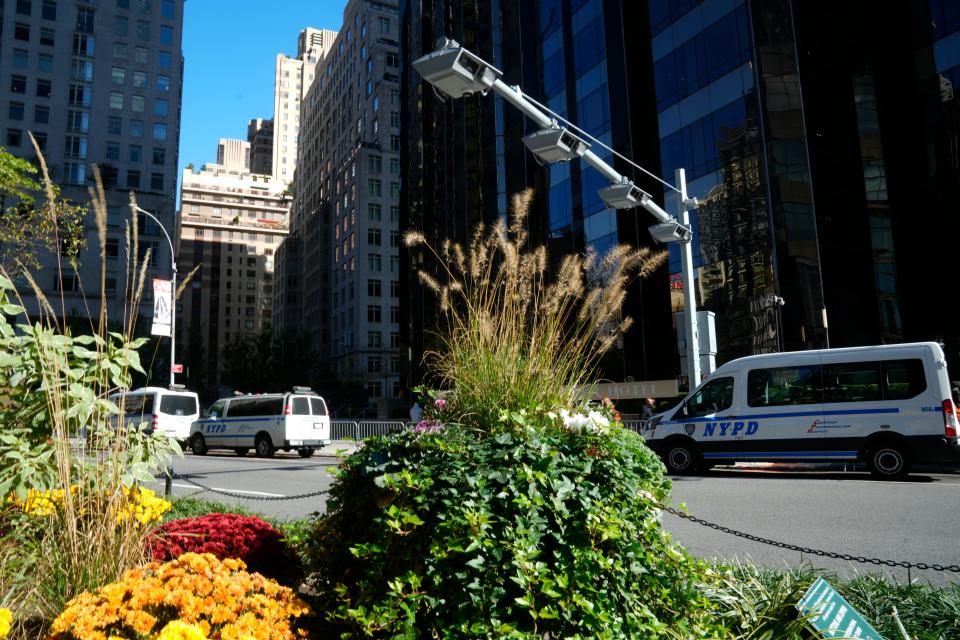MTA approves congestion pricing toll for Manhattan, triggering public comment period
- Oops!Something went wrong.Please try again later.
The Metropolitan Transportation Authority approved a congestion pricing plan Wednesday for vehicles entering Manhattan below 60th Street that was recommended last week by the Traffic Mobility Review Board.
The move triggers a 60-day public comment period.
The board voted 9-1 to advance the plan, with David Mack the lone member in opposition. Among the TMRB recommendations are a $15 toll for cars and a truck charge of either $24 or $36 depending on the size, according to the report obtained by NorthJersey.com.
Congestion toll rates would apply from 5 a.m. to 9 p.m. on weekdays and 9 a.m. to 9 p.m. on weekends. There are discounts available for low-income drivers and others. The overnight rate would be 75% lower than during the daytime windows.
Story continues below photo gallery
Passenger vehicles entering Manhattan via the Lincoln or Holland tunnel from New Jersey, as well as the Hugh Carey and Queens-Midtown tunnels, would receive a $5 credit during the daytime hours. Motorcycles would be charged $7.50, with a $2.50 credit if entering through the tunnels.
Cars would be charged only once a day. No toll would be charged when a vehicle exits the affected zone.
No toll would be charged to vehicles that stay on the FDR Drive or the West Side Highway.
For-hire vehicles and taxis would charge customers per ride $2.50 and $1.25, respectively.
Low-income vehicle owners who qualify and register with Triborough Bridge and Tunnel Authority should receive a 50% discount on the daytime auto toll after the first 10 trips made by that vehicle in a calendar month.

Janno Lieber, chair and CEO of the MTA, called the plan "essential to the city's future" economically and from a quality-of-life standpoint, in a press conference Wednesday afternoon.
"This is that rare moment when business and environmentalists actually come together," Lieber said. "They're frequently at loggerheads, they're frequently at each other's throats even, and on this issue they've come together because there is a consensus that has developed."
Public comment period, then hearings
Wednesday's approval moves the process ahead to a 60-day public comment period, followed by four public hearings that will likely take place in "very late February or early March," Lieber said.
The MTA has already held about 25 public outreach events and hearings and responded to 70,000 comments from residents, Lieber said. He does not anticipate many changes to the plan as outlined but noted that the board is "taking the public comment process very seriously."
"We have a great proposal on the table that I think has gotten very positive reviews from the TMRB, and now we're going to go out to the public yet again," Lieber said. "But we're not ruling out changes if we hear something new or different that we need to take account of."
More: Drivers may have to pay $15 to enter midtown Manhattan under NYC congestion pricing plan
More: Could GW Bridge traffic increase from congestion pricing? Here's what one report said
Gov. Phil Murphy criticized the plan in a statement last week as "an unfair and ill-conceived congestion pricing tolling scheme on New Jersey commuters." He also said transportation officials failed to consult with his administration from the beginning and viewed travelers from the Garden State as "a convenient way to fill an MTA budget hole."
But Lieber said Wednesday that he believes the plan is beneficial for New Jerseyans in multiple ways. More residents take public transit into New York than drive, he said, and those who do take their cars in should spend less time waiting in traffic under the proposal.
In addition to reducing congestion and improving air quality in Manhattan, the toll would raise $1 billion a year for the MTA's capital program.
Overhead gantries that will hold the devices to scan license plates or E-ZPass transponders to toll vehicles have already begun going up around the perimeter of the tolling zone, which is below 60th Street but doesn't include the highways on the edge of Manhattan.
Two lawsuits have been launched in New Jersey to try to stop congestion pricing.
One, from the Murphy administration, challenges the Federal Highway Administration's decision not to seek a more thorough environmental review.
The other, filed by Bergen County residents, alleges that the program would cause more health problems and seeks to require the MTA to create a fund for remediation efforts. Neither of these lawsuits has so far paused the advancement of the program, which the MTA has said is expected to roll out in the spring.
This article originally appeared on NorthJersey.com: MTA approves NYC congestion pricing toll

